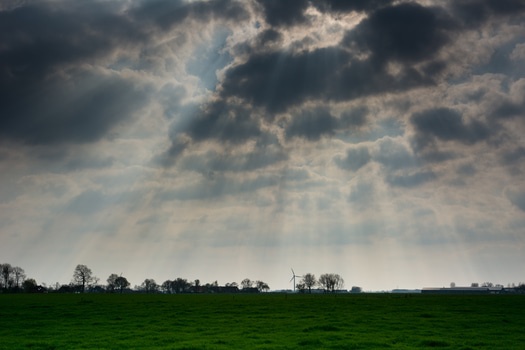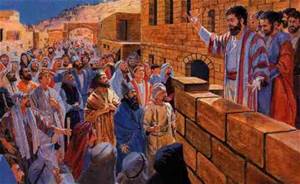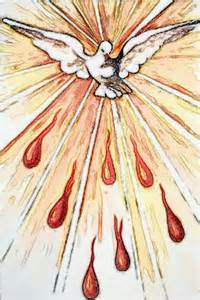
Whitsuntide, or Pentecost: A feast in commemoration and honor of the Holy Ghost, descending visibly upon the heads of the Apostles, in the shape of tongues, as it were of fire.
![waves-close-up-view-circle-drop-of-water-medium[1]](http://www.magnificatmedia.com/wp-content/uploads/2016/05/waves-close-up-view-circle-drop-of-water-medium1.jpg) It is called Whit Sunday, because at this time the Catechumens, who were then baptized, were all in white. It was anciently called Wied Sunday, that is, holy Sunday; for Wied, or Wihed, signifies holy in the old Saxon language. It is called Pentecost, from the Greek word, signifying fiftieth, it being the fiftieth day after the resurrection, and the tenth day after the ascension. The proper devotion of this time, is to invite the Holy Ghost into our souls by fervent prayer, and to give ourselves up to his divine influences.
It is called Whit Sunday, because at this time the Catechumens, who were then baptized, were all in white. It was anciently called Wied Sunday, that is, holy Sunday; for Wied, or Wihed, signifies holy in the old Saxon language. It is called Pentecost, from the Greek word, signifying fiftieth, it being the fiftieth day after the resurrection, and the tenth day after the ascension. The proper devotion of this time, is to invite the Holy Ghost into our souls by fervent prayer, and to give ourselves up to his divine influences.
Saint John Chrysostom in the year 407 describes Pentecost by saying, “Today we have arrived at the peak of all blessings, we have reached the capital (metropolis) of feasts, we have obtained the very fruit of our Lord’s promise.” During the early centuries the day itself was celebrated in the Western Church. After the seventh century, the whole week came to be considered a time of festive observance. The Council of Constance, in the year 1094 limited this prohibition to three days. By the year 1911, Pope Saint Pius X abolished Monday as a holyday of obligation.
The Holy Ghost descended upon the Apostles and the disciples on the tenth day after the Ascension, about the ninth hour; a day on which the Jews celebrated the feast of ![th[8] (16)](http://www.magnificatmedia.com/wp-content/uploads/2016/05/th8-16.jpg) Pentecost; Acts ii. I. This day was chosen to make the relation of the reality with the figure more striking. The Jews had received the law from God, engraven on stone, fifty days after they were brought out of Egypt; and God desired that his Holy Spirit should engrave his new law upon the hearts of men, fifty days after Jesus had, by his Resurrection, delivered us from the slavery of our enemies, prefigured by the Egyptians; St. Aug. de Spirit. et lit. c.16, n.28.
Pentecost; Acts ii. I. This day was chosen to make the relation of the reality with the figure more striking. The Jews had received the law from God, engraven on stone, fifty days after they were brought out of Egypt; and God desired that his Holy Spirit should engrave his new law upon the hearts of men, fifty days after Jesus had, by his Resurrection, delivered us from the slavery of our enemies, prefigured by the Egyptians; St. Aug. de Spirit. et lit. c.16, n.28.
In the midst of a noise, as if of mighty winds, which filled the house; cloven tongues of fire appeared on each, and they were filled with the Holy Ghost; Acts ii. Thus the third person of the blessed Trinity descended upon them, animated them, and made them his dwelling; John xiv. 16, 17. He made them new men; he filled them with lively light, with the love of God, with zeal, virtue, power; Luke xxiv. 49; Rom., v. 4. He opened the eyes of their minds, that they might understand the most abstruse truths of religion; John xvi. 13. They had been uneducated and powerless; he enabled them to speak strange tongues, and work miracles; Acts ii. 4.
The Apostles received the Holy Ghost to communicate him, with all his gifts and graces, by themselves and their successors, to all faithful followers of Jesus; Acts viii. 15; Rom. v. 5; viii. 9. The faithful received the Holy Spirit by the ministry of the Apostles or their successors, both in Baptism and Confirmation. The effects the Holy Ghost produces in the hearts of those who receive him is the love of God, zeal, power, and virtue; Rom. v. 5; viii. 9, etc.
 The prophets foretold the descent of the Holy Spirit. You will find this when St. Peter, in his first sermon to the Jews, shows them that Joel foretold this event; Acts ii. 16; Joel ii. 28. It was also foretold by Isaiah xliv. 3; by Jeremiah, xxxi. 33; Heb. x. 16; and most strikingly by Ezechial, xxxvi. 26, 27. According to all these, the Holy Ghost was to renovate man, to shed the love God on every heart; and this has been the effect produced in all ages on the Christian body; Rom. v. 5; viii. 9, 26, etc. After the Apostles received the Holy Ghost they preached the Gospel first to the Jews, then to the Samaritans, and then to the Gentiles scattered over the whole earth. They announced redemption, reconciliation, the wonders of the life, death, Resurrection and Ascension of Jesus, to all men.
The prophets foretold the descent of the Holy Spirit. You will find this when St. Peter, in his first sermon to the Jews, shows them that Joel foretold this event; Acts ii. 16; Joel ii. 28. It was also foretold by Isaiah xliv. 3; by Jeremiah, xxxi. 33; Heb. x. 16; and most strikingly by Ezechial, xxxvi. 26, 27. According to all these, the Holy Ghost was to renovate man, to shed the love God on every heart; and this has been the effect produced in all ages on the Christian body; Rom. v. 5; viii. 9, 26, etc. After the Apostles received the Holy Ghost they preached the Gospel first to the Jews, then to the Samaritans, and then to the Gentiles scattered over the whole earth. They announced redemption, reconciliation, the wonders of the life, death, Resurrection and Ascension of Jesus, to all men.
There are no special liturgical ceremonies on Whit Sunday apart from the Holy Sacrifice, which is usually celebrated with festive splendor and solemnity. In the Latin Church the color of the liturgical vestments is red, symbolizing the love of the Holy Ghost. After the Gradual of the Mass the ancient sequence Veni Sancte Spiritus (Come, Holy Spirit) is recited or sung on each day of Pentecost week. This hymn appeared first in liturgical books around the year 1200. It has changed over the centuries but most probably, however, its author was Cardinal Stephen Langton, year 1128, Archbishop of Canterbury. The poem has been known from medieval times as the “Golden Sequence” because of its richness in thought and expression.
The gift of the Holy Ghost to the Church means, effectively, for each one of us the fullness  of the life of grace, beginning with baptism and coming in due course to full development. It meant the same for the Apostles, and also the passing on of the same life from a spring that will never run dry. Pentecost is not merely the anniversary of a past event; it is an ever-living reality in the Church and in us. In the Pentecost Liturgy, the Veni Creator has been assigned as the official opening prayer for Church councils and synods. It is recited and sung by the faithful all over the world. “Come, Holy Ghost, fill the hearts of Thy faithful, and kindle in them the fire of Thy love”: that is the fervent prayer of the Church at the Alleluia of the Mass every day of the Octave; we should make it our own and the Holy Ghost will come down upon us.
of the life of grace, beginning with baptism and coming in due course to full development. It meant the same for the Apostles, and also the passing on of the same life from a spring that will never run dry. Pentecost is not merely the anniversary of a past event; it is an ever-living reality in the Church and in us. In the Pentecost Liturgy, the Veni Creator has been assigned as the official opening prayer for Church councils and synods. It is recited and sung by the faithful all over the world. “Come, Holy Ghost, fill the hearts of Thy faithful, and kindle in them the fire of Thy love”: that is the fervent prayer of the Church at the Alleluia of the Mass every day of the Octave; we should make it our own and the Holy Ghost will come down upon us.
Spiritus Domini – Pentecost
Veni Sancte Spiritus
Rome at Pantheon – Solemnity of Pentecost
